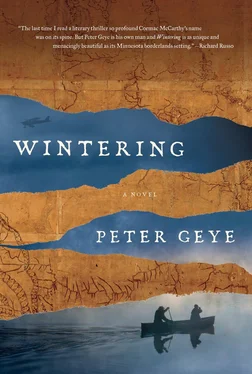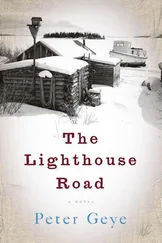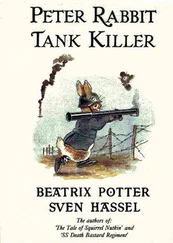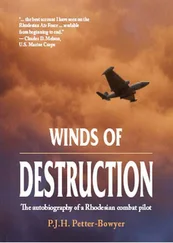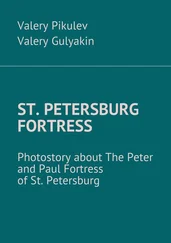Harry turned and smiled. He held his compass in his hands, the wind blowing the pompom on his red hat like a rooster’s tail on a weathervane. “A perfect day for scouting, eh?” He had to shout to make his voice heard above the relentless gale.
He pointed up the narrows. “North!” he said. “Look at that rise.” He moved next to Gus and leaned into his shoulder. “A hill like that could damn well be the divide.” He turned and looked again up the lake. “What do you think?”
Gus scanned the ridge once more. “I think we’re lucky we didn’t get crushed by timber last night.”
“I guess any night you don’t die under a falling tree is a lucky one,” Harry said. He had a dopey look on his face.
Gus looked up the narrows. “You really think that could be the divide?”
“I’ll make coffee, then we’ll go have a look.”
—
They launched only one canoe, Harry taking the helm. Even though it was no great distance up the narrows, they were paddling into the northerly wind funneling down the gorge, and it took them nearly half an hour. Near the end of the lake Gus saw a sort of line, a change in the light. The wind was visible above it, and below it the air was clear and hard. As they passed under it, the atmosphere suddenly felt almost weightless. The wind — noisy as a passing train when upon them — now quieted, nothing more than a faint whistling.
Harry turned to look back at Gus in the stern. “Creepy, eh?”
It was ominous, all that shifting light and sound. When Gus turned back himself to study the lake behind them, he thought, We’re gone. There’s no turning back. Not now.
They gently beached the canoe on talus black with rainwater. They heard the unmistakable hammering of a waterfall and followed the sound west by climbing a steep escarpment. The roar was soon imminent and everywhere and Gus expected to see falls at any minute, but they ventured as far north as they did west before they found it twenty minutes later. A pool of water the size of a baseball infield, rimmed with fallen trees and knifelike rocks, caught the water falling from thirty feet above. It was beautiful. The mist rising. The cedar trees lining the falls and drooping under all that wetness. The wind forgotten in this seam of the earth.
Harry sat down on a rotted-out cedar half submerged in the pool. “Goddamnit,” he said, his voice hoarse. He coughed and spit and said “Goddamnit” again, as if maybe Gus hadn’t heard him the first time.
“What’s wrong?”
“This water’s flowing the wrong way.” He snapped a branch off the fallen tree and threw it into the shallow creek running from the pool, as though he expected it to flow up the falls instead of down. He watched it bounce between rocks for a moment and said, “Obviously.” He shook his head and added, “What kind of a fool would think a rise like this would go farther down the other side?”
“What’s the big deal?”
He shook his head. “I’m not thinking straight. We can’t have that.” He turned and looked up at the falls.
“We should still go look,” Gus said. He was rightly confused by his father’s mood swing.
Harry said nothing, just started wading around the edge of the water. It was hazardous alongside those falls, the rocks slick and sharp and given to shifting underfoot. The temperature must have fallen thirty degrees overnight, which made the water feel warmer but the air biting and cruel. When they reached the top, the ground flattened and spread out in a tangle of warped cedars. They stumbled through the grove in water up to their thighs, the wind back in their faces. When they came through the trees a lake opened wide and white with churning water. All along the southern shore the cliffs dwarfed the ones in the gorge below.
A look like panic came over Harry’s face — almost as if he’d been slapped — and he surveyed their surroundings like a simpleton for a few long minutes. But then his face lit up. He took the book of maps from his daypack and flipped between two pages, then studied these cliffs again. “This could damn well be Rouge Lake. That means we’re on track after all.” Now he looked behind them, from where they’d just come, and conjured with the maps and his memory for a long time. He nodded emphatically. “Yes, sir, I think this might very well be Rouge.”
Gus pulled himself up into the crotch of a cedar and sat with his back to the open water. The wind blew through his wet pants and burned cold. “It won’t be easy through here,” he said. “It’s like a ball of yarn, all these trees. Won’t be easy up those falls with the boats, either.” He pointed behind him. “It’ll take us all day.”
Harry squinted up at Gus. “We’ve been at this long enough for a day off, eh? What say we tackle this portage tomorrow? Maybe give this wind a chance to blow itself out?”
“I’m for that,” Gus said.
They started back down; in spots it was so steep that it seemed impossible they’d climbed it without aid of a ladder or ropes. Before returning to the canoe, they foraged in the undergrowth of the cedar swamp for deadfall. They found four good logs and loaded them into the canoe and paddled back to their campsite, the gunwales not more than six inches above the waterline.
After all those days of going strong it was strange to idle around the campsite, but that’s just what they did. Harry roused a huge fire and Gus went to work on the deadfall, quartering all the logs before splitting them with the hatchet. They hung a rope between two trees and washed their clothes and hung them near the heat of the fire to dry. Gus made a pot of coffee, and by noon they’d done all the chores.
Harry sat with his feet toward the fire and took the Remington apart, carefully wiping out the barrel after all the rain the day before. Gus watched him, feeling drowsy and hungry and in some back room of himself, like he wished he’d never joined this expedition. His father must have read his mood, because he said, “You look like you came out on the wrong end of a bad night’s sleep.”
“I’ve had better. That’s for sure.”
Harry was oiling the pins, squinting down his nose at his work.
“I was going to fish,” Gus said, “but I think I’ll take a nap.”
Harry kept working on the gun. “A nap would do you well. I’ll wake you for dinner.”
So Gus climbed under their canvas and wrapped himself in the sleeping sack. He slept hard that afternoon. When he woke it was to a sound like a baaing sheep somewhere near. His right arm and shoulder tingled from sleeping on them wrong. He lay there listening to the strange sound while the wind ruffled the canvas. After a while his blood washed the prickling out of his arm and he sat up. Through the tent flap he could see Harry up the shore, standing in plain sight beside a boulder the size of a bear and aiming the Remington across the lake.
Gus had seen that look on his face before — a great many times — and he knew there was game in his sights. He crawled up to the flap and peered out. On the opposite shore, a fawn stood with its hind end to them, its bleats carrying across the water on the strong wind coming down the cliff. He could still see vestiges of the fawn’s spots.
Gus swept his glance between the deer and Harry for what seemed ten minutes. Twice his father lowered the gun and closed his eyes with the countenance of a man at prayer. When he opened his eyes again he retrained his sights on the fawn. Then he noticed Gus crouching in the tent, aimed a third time, and fired.
Gus was surprised to see the fawn merely flinch and buck. It seemed impossible that Harry would have missed so easy a shot, but Gus felt relieved when the fawn only bawled louder.
Harry slung the Remington over his shoulder and walked briskly toward him. Once within earshot, he shouted, “Grab the hunting knife and come on.”
Читать дальше
